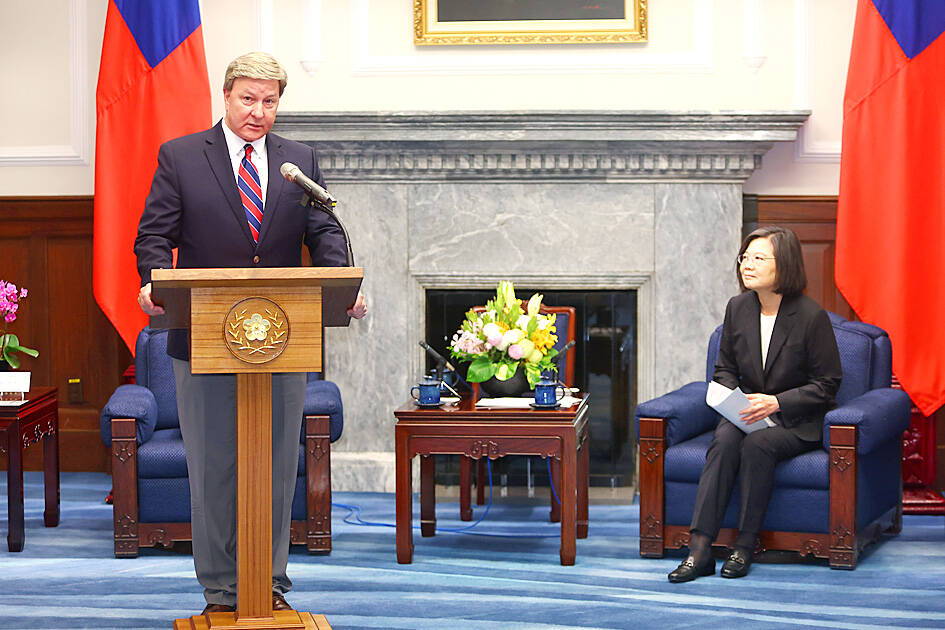President Tsai Ing-wen (蔡英文) yesterday underscored her administration’s intent to cement Taiwan-US relations as she welcomed a delegation of US lawmakers led by US Representative Mike Rogers, chairman of the US House of Representatives Armed Services Committee.
“We thank the US Congress for consistently showing bipartisan concern for Taiwan’s security and its show of support [for the nation] through concrete actions,” Tsai told the delegation at the Presidential Office in Taipei.
The nation expresses gratitude to committee members for their continued efforts to “include policy measures in the annual renewal of the National Defense Authorization Act that enhanced Taiwan’s defensive capabilities,” she said.

Photo: CNA
“Deepening the security cooperation between Taiwan and the US is crucial for maintaining the security of Taiwan and the Indo-Pacific region,” Tsai said.
Members of the committee demonstrated their attentiveness to developments on the international stage and challenges to democracies, she said, adding that the committee has “protected the national security of the US and its democratic allies.”
Tsai also thanked the US Congress for its support in facilitating the signing of the first agreement under the US-Taiwan Initiative on 21st-Century Trade earlier this month, which “marked a new milestone in Taiwan-US trade and economic relations.”
Taipei intends to accelerate its efforts with Washington to create a comprehensive solution to double taxation affecting Taiwanese and US businesspeople to promote economic exchanges between the two countries, she said.
The Presidential Office in a news release cited Rogers as saying that Taiwan and the US share a long and important friendship based on the common values of the rule of law, democracy, and the belief in a free and open Indo-Pacific region.
The bipartisan congressional delegation led by Rogers includes US representatives Adam Smith, Joe Courtney, John Garamendi, Jill Tokuda, David Rouzer, Gary Palmer, James Moylan and Corry Mills.
In other news, Nikki Haley, a former US ambassador to the UN and a Republican presidential hopeful, on Tuesday said that Washington and its allies should “give Taiwan everything it needs to defend itself,” and make clear to Beijing that aggression would mean “a full-blown economic decoupling that would massively damage China.”
Beijing is “an enemy” to the US and “the most dangerous opponent we have faced since World War II,” Haley said in a speech at the American Enterprise Institute in Washington.
“The [Chinese] Communist Party’s endgame is clear. China is preparing its people for war. [Chinese] President Xi [Jinping, 習近平] has openly said it,” she said. “We should take him at his word and act accordingly.”
The US must get Europe to recognize the threat China poses to its security and shake the bloc out of its slumber, Haley said.
Washington should deepen military cooperation with Japan, South Korea, Australia and other partners in the Indo-Pacific region, she said.

Seventy percent of middle and elementary schools now conduct English classes entirely in English, the Ministry of Education said, as it encourages schools nationwide to adopt this practice Minister of Education (MOE) Cheng Ying-yao (鄭英耀) is scheduled to present a report on the government’s bilingual education policy to the Legislative Yuan’s Education and Culture Committee today. The report would outline strategies aimed at expanding access to education, reducing regional disparities and improving talent cultivation. Implementation of bilingual education policies has varied across local governments, occasionally drawing public criticism. For example, some schools have required teachers of non-English subjects to pass English proficiency

‘FORM OF PROTEST’: The German Institute Taipei said it was ‘shocked’ to see Nazi symbolism used in connection with political aims as it condemned the incident Sung Chien-liang (宋建樑), who led efforts to recall Democratic Progressive Party (DPP) Legislator Lee Kun-cheng (李坤城), was released on bail of NT$80,000 yesterday amid an outcry over a Nazi armband he wore to questioning the night before. Sung arrived at the New Taipei City District Prosecutors’ Office for questioning in a recall petition forgery case on Tuesday night wearing a red armband bearing a swastika, carrying a copy of Adolf Hitler’s Mein Kampf and giving a Nazi salute. Sung left the building at 1:15am without the armband and apparently covering the book with a coat. This is a serious international scandal and Chinese

TRADE: The premier pledged safeguards on ‘Made in Taiwan’ labeling, anti-dumping measures and stricter export controls to strengthen its position in trade talks Products labeled “made in Taiwan” must be genuinely made in Taiwan, Premier Cho Jung-tai (卓榮泰) said yesterday, vowing to enforce strict safeguards against “origin laundering” and initiate anti-dumping investigations to prevent China dumping its products in Taiwan. Cho made the remarks in a discussion session with representatives from industries in Kaohsiung. In response to the US government’s recent announcement of “reciprocal” tariffs on its trading partners, President William Lai (賴清德) and Cho last week began a series of consultations with industry leaders nationwide to gather feedback and address concerns. Taiwanese and US officials held a videoconference on Friday evening to discuss the

PERSONAL DATA: The implicated KMT members allegedly compiled their petitions by copying names from party lists without the consent of the people concerned Judicial authorities searched six locations yesterday and questioned six people, including one elderly Chinese Nationalist Party (KMT) member and five KMT Youth League associates, about alleged signature forgery and fraud relating to their recall efforts against two Democratic Progressive Party (DPP) legislators. After launching a probe into alleged signature forgery and related fraud in the KMT’s recall effort, prosecutors received a number of complaints, including about one petition that had 1,748 signatures of voters whose family members said they had already passed away, and also voters who said they did not approve the use of their name, Taipei Deputy Chief Prosecutor